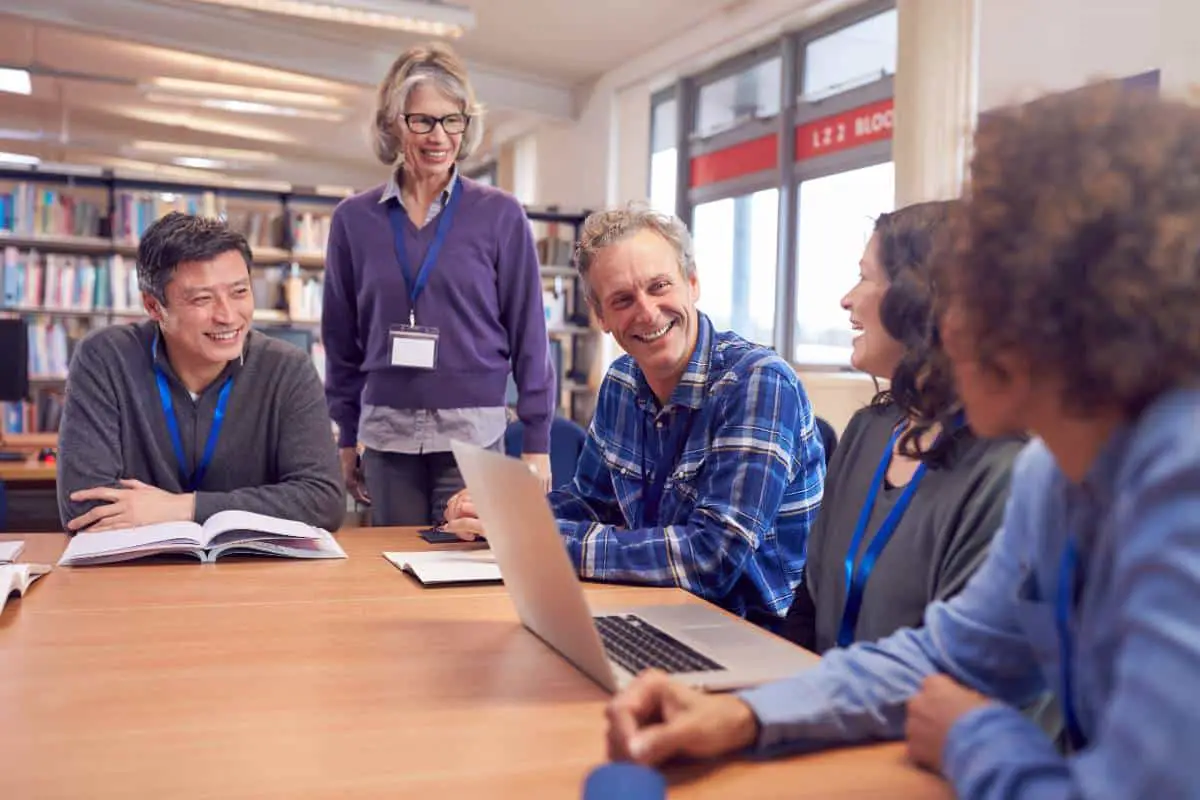Lifelong Learning Thailand As An Expat
As founder of BetterLivingAsia.com, helping individuals fulfill lives abroad, I’ve discovered Thailand’s extensive lifelong learning culture. With fluctuating technologies and job markets, Thailand emphasizes continuous education policies benefiting citizens while developing its economy.
Lifelong learning involves consistent training, growth, and skill upgrades for personal and professional goals throughout life. Instead of limiting education to childhood, Thailand promotes self-improvement across ages.
Key Takeaways
- Lifelong learning enables continuous skill development and career growth amid economic changes
- Thailand has policies, infrastructure, and partnerships supporting accessible education across ages
- Individuals benefit from improved employability while Thailand gains a global workforce
Lifelong Learning in Thailand: A Comprehensive Guide
Given frequent changes in workplace demands and roles, lifelong learning enables both employees and employers to reskill and reach fuller potential. As Thailand pivots towards a digital, global economy relying on knowledgeable workforces, the country prioritizes citizen education through various government and private programs.
With the country’s 1999 National Education Act and 2008 Non-Formal and Informal Education Promotion Act, Thailand has underscored accessible, quality education for all groups in formal schools and beyond. Those unable to complete formal education receive alternative opportunities through non-formal channels.
Major Policies and Initiatives Supporting Lifelong Learning
Key Legislation Expanding Lifelong Education
The 1999 National Education Act mandated 12 years of free schooling while treating education as a “lifelong process”. The law organized systems for early childhood to higher education, requiring quality assessments. The subsequent 2002 Amended Act and 2008 Non-Formal and Informal Promotion Act furthered access and development programs.
Literacy and Adult Education Policies
Various policies tackle illiteracy through ongoing adult curricula suited for practical usage. Programs like the “Functional Literacy” initiative teach basic reading, writing, communication, and livelihood skills. Thailand hopes to minimize achievement gaps between rural and urban areas in this domain.
Access and Equality Policies
- Alternative education channels assist groups including impoverished children, the disabled, and ethnic minorities in accessing schooling.
- The 2008 Act especially aids socioeconomic inclusion for non-mainstream students through informal community-based learning.
- Educational budgets and investments also broaden access, promoted lately through lifelong learning credits/funds.
Administering Lifelong Learning
Responsible institutions like the Office of Non-Formal and Informal Education (ONIE) coordinate with schools and community organizations nationwide to conduct free teaching programs, training workshops, and skill-building exercises.
ONIE partnerships with public and private groups continue addressing unemployment and social mobility through adult education suites tailored for local needs.
Institutions and Infrastructure Enabling Lifelong Learning
Formal School Systems
Traditional schools implement 12 years of mandatory education. Academic subjects and exams receive balanced weighting alongside arts, sports, and ethics.
Vocational classes are alternately available in secondary grades, supplemented by specialized colleges. Universities promote graduate study and research suiting national agendas.
Non-formal and Informal Education Systems
Since most Thais don’t attend tertiary academies, non-formal continuing education is indispensable.
Key Organizations
ONIE manages regional/local community learning sites with varied services:
- Functional literacy lessons
- Adult secondary academic equivalency
- IT, language, hobby instruction
- Distance programming
Related agencies host community education activities regarding health, livelihoods, agriculture, and monastic subjects.
Informal and Distance Learning
Informal channels outside schools increase participation through open educational resources:
- Rural radio instruction
- Instructional TV via satellite
- Mobile libraries
Web-based teacher training and remote classes are upcoming distance methods.
Innovations and Industry Partnerships
blending academic lessons with interpersonal abilities coveted by employers.
Global partnership initiatives like UNESCO-supported migrant literacy studies apply international expertise for domestic curricula tailored towards marginalized Thais.
Joint government and corporate projects also upgrade staff through reimbursed web tutorials, career coaching in high-demand fields like engineering and computer science, and discounted reskilling boot camps.
Benefits and Outcomes of Lifelong Learning
For citizens, lifelong education cultivates transferable career competencies from youth onwards and through retirement. This guarantees income security.
Updated agricultural, digital, and English training reflects occupational trends aligning labor supply with actual market needs. Exposure to various fields inspires entrepreneurism and national competitiveness.
For Thailand, a roster of multi-skilled lifelong learners sustains economic development. The flexible, knowledgeable workforce attracts technology/infrastructure ventures; proactive skill-building prevents structural unemployment.
Social outcomes also improve through informed, civically engaged citizens able to access healthcare, financial services, and legal rights education via lifelong learning programs. Functional literacy enables democratic participation for all.
Future Directions and Challenges
Looking ahead, ONIE prioritizes decentralized administration allowing local flexibility. Mobile platforms would enable those in informal economies to access education.
However, sustaining teaching excellence and participation across diverse groups remains difficult. Cost barriers persist for hardcore poor families who prioritize livelihoods over reskilling.
Still, lifelong learning enjoys embedded cultural validation, governmental promotion, and public enthusiasm. Thailand is strengthening into a leading knowledge economy fueled by this institutional support.
What is Lifelong Learning and Why Is It Important in Thailand?
Thais traditionally value learning as a continuous lifelong process beyond formal schooling. Lifelong learning means developing new personal and professional skills through accessible adult education and training opportunities, from basic literacy to vocational courses, academic subjects, and informal tutoring. It prioritizes self-improvement across every life stage.
This lifelong learning culture reflects Thailand’s dynamic job market. With frequent economic shifts and digital disruption, employees and organizations must frequently reskill and upgrade to remain competitive. Lifelong learning enables Thai workers to master emerging roles despite limited educational backgrounds.
At a national level, this culture generates a skilled, future-ready workforce able to attract global industries and drive development. The government and private sector actively promote lifelong education possibilities through innovative policies, programs, and events across ages and regions.

The Concept of Lifelong Learning in Thai Society
Thailand’s Buddhist traditions treat learning as an incremental ethical journey motivated by self-development, rather than material incentives alone. Knowledge is power used wisely to help communities. This matches with the 1999 National Education Act prioritizing well-rounded personal growth alongside occupational goals and treating education as an intrinsically rewarding lifelong process.
Functional lifelong learning enables democratic rights and mobility for rural citizens through basic health and civics awareness. Special programs help minority groups and the differently abled access such learning for inclusion’s sake. Expats can also benefit from Thailand’s extensive informal lifelong knowledge networks based around local wisdoms and flexible education models.
Government Initiatives to Promote Lifelong Learning in Thailand
The Thai government actively facilitates accessible, community-based lifelong learning countrywide through the Office of Non-Formal and Informal Education (ONIE) and partnerships with public schools, religious centers, businesses, and NGOs.
For example, it funds thousands of district-level lifelong learning centers offering IT lessons, language classes, hobby instruction, distance learning portals, literacy coaching, and more. Special rural mobile training units, agricultural extension programs, temple-led ethics curricula further this localized yet connected lifelong learning grid even in remote villages. Tax breaks, public campaigns, and industry tie-ups continue attracting Thais to reskill while systemic educational reforms enhance instruction excellence across channels.
Partnerships Enhancing Educational Opportunities for Expats
Expatriate professionals, entrepreneurs, homemakers, or retirees can all leverage Thailand’s extensive non-formal lifelong learning ecosystem. Programs are often free or affordable. As an expat member myself, I find most providers extremely welcoming.
One can pick relevant activities from numerous community learning groups, religious/cultural institute seminars, corporate training processes, higher academy workshops and more. Consider joining Thai language lessons supporting expat localization and cultural integration.
Support groups ease befriending locals. Seek veterans who went from visitors to citizens by embracing Thailand’s creative lifelong educational pluralism through patience and respect – values underpinning this learning culture.
Supporting Underprivileged Communities Through Lifelong Learning
While Thailand has an extensive lifelong learning infrastructure, equitable access remains a key priority, especially for marginalized low-income groups. Many government and civil society initiatives aim to foster skill development and employment for such vulnerable populations through customized lifelong learning support, career coaching, and community partnerships. Participation enables economic and social mobility.
Education Initiatives Aimed at Underprivileged Groups in Thailand
Under the 1999 Education Act and informal learning policies, disadvantaged students including rural citizens, urban poor, ethnic minorities, migrant families, and differently abled individuals receive focused lifelong learning opportunities under Alternative Education channels.
For example, the Non-Formal and Informal Education Promotion Act 2008 upholds non-mainstream groups’ right to community learning resources.
Special functional literacy programs in rural villages or urban slums teaches basic literacy for managing daily needs, while customized skilling projects enable traditional handicraftspeople and cottage industry workers to sustain traditional livelihoods through modernized training in design, ecommerce, accounting etc bridging grassroots and commercial domains.
Fostering Skill Development Among the Underprivileged Population
National Skills Development Funds, vocational training subsidies, and decentralized village learning centers allow provincial Thais to access locally suitable training for agricultural or non-farm jobs near hometowns rather than migrate towards low-skilled construction/domestic labor in cities.
This prevents displacement and upholds community integrity.
NGO projects like targeted English lessons, healthcare assistant crash courses, hospitality skill workshops, computer coding bootcamps for provincial/ghetto youth with limited education often arranged in religious centers, when supplemented by affordable loans and employment assistance, secure living-wage jobs reducing dependence on exploitative grey economies.
The Role of Education Expo 2024 in Supporting Underprivileged Communities
Annual lifelong learning fairs like the upcoming National Education and Career Expo 2024 raise awareness regarding such initiatives among the underprivileged while connecting behind-the-margins groups to recruiters, schools, and government agencies guiding those eligible for funded skill training.
Massive discounts on professional development courses, inspirational talks by leaders who similarly overcame poverty through expertise-building, and contests celebrating self-taught technopreneurs demonstrate first-hand how lifelong learning enables destitute citizens to rewrite their destinies.

FAQs
What is lifelong learning?
Lifelong learning means consistently developing new personal and professional skills via education and training throughout one’s life rather than limiting learning to childhood.
Why is lifelong learning important for Thailand?
Ongoing adult education allows Thailand’s workforce to reskill for new technologies and job roles required in its evolving economy. This benefits career security.
What lifelong learning opportunities exist in Thailand?
Government, corporate, and community literacy programs, vocational courses, academic classes, and informal lessons are all examples of lifelong learning channels.
Who provides and supports lifelong learning programs?
Thailand’s government (ex. ONIE), schools, employers, NGOs, and private partners all enable and supply lifelong education opportunities suiting specialized demands.
What challenges exist in enabling lifelong learning for all?
Practical difficulties like costs as well as uneven instruction quality and participation across Thailand’s diverse citizenry persist, especially benefitting urban over rural groups.
Lifelong learning is indispensable for personal fulfillment and national development amidst global change. Thailand presents a model case for comprehensive lifelong education systems with impressive outcomes and opportunities to enrich lives.
Conclusion
I hope this overview has helped explain Thailand’s exceptional lifelong learning culture and the meaningful impact it has on people’s lives. Education unlocks potential – I’ve seen this myself while assisting fellow expats to discover fulfilling opportunities abroad over the past 35 years.
If you have any other questions as you consider your own development journey, whether about specific programs, personalized advice for your situation, or simply a friendly conversation about Thailand’s welcoming learning communities, please reach out!
I greatly enjoy exchanging ideas and helping visitors thoughtfully participate in this country’s advancement. You can subscribe to our newsletter for regular updates and feel free to schedule a consultation if you need tailored insights.
Wishing you the very best with your educational aspirations – don’t hesitate to get in touch!






